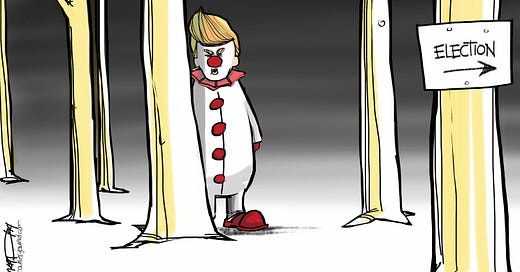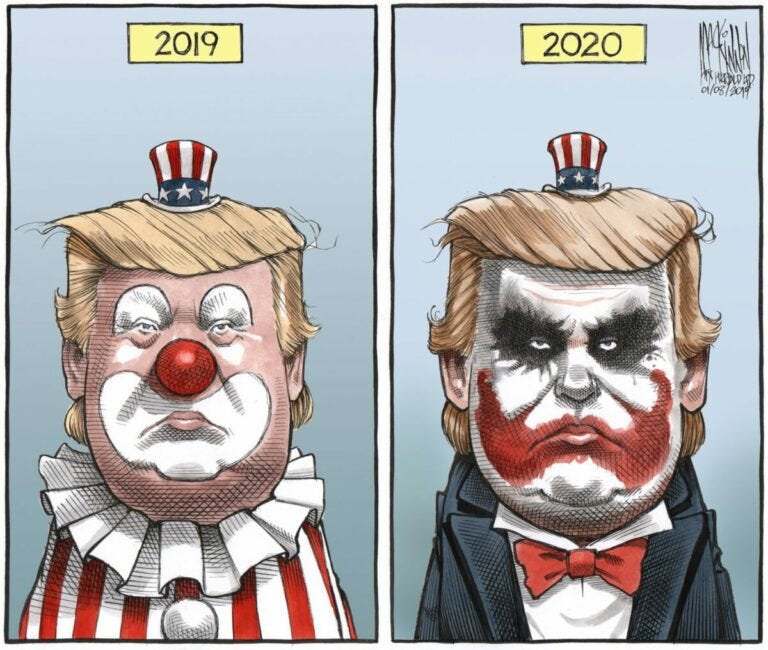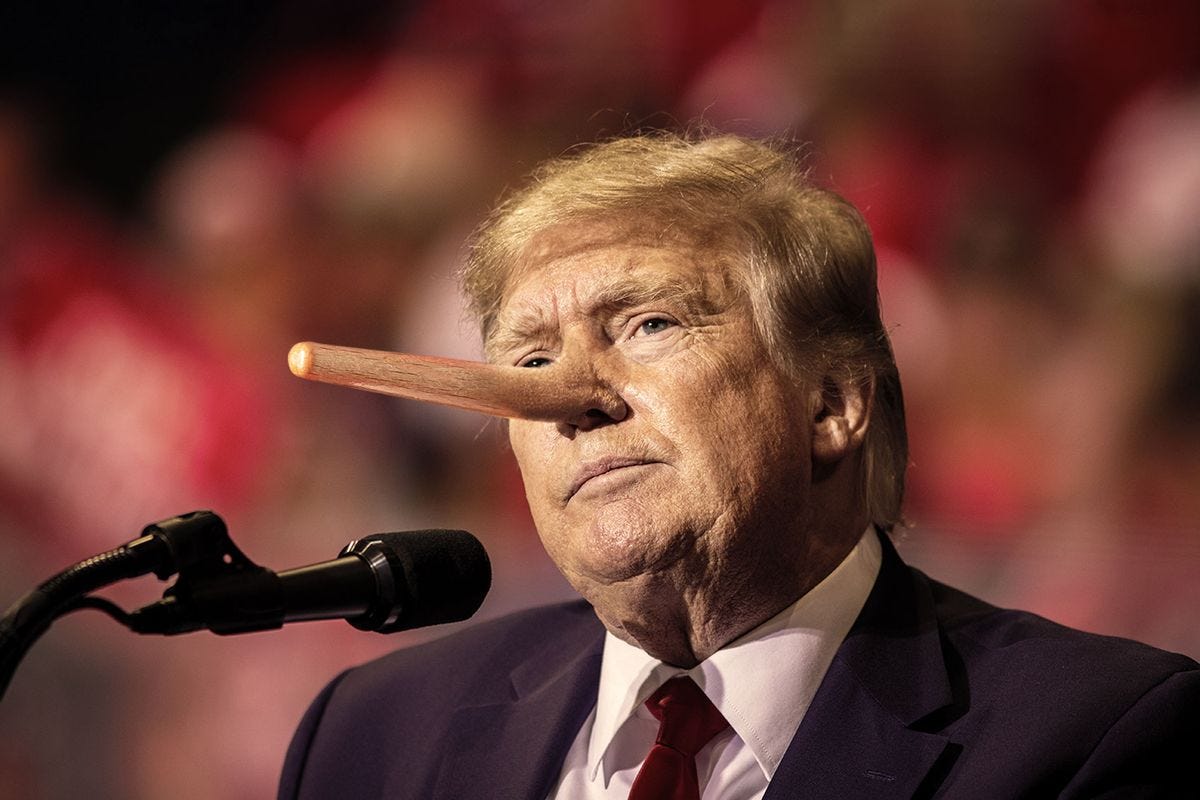[ Acknowledgements: I thank philosopher Jon Tresan for most of the main ideas in this post. See his essay. ]
1. The Election Theft Puzzle
Polls indicate that 70% of Republicans think the 2020 election was stolen from Donald Trump. Question for Republicans: Why do you think Trump let that happen?
Bear in mind:
He was in power at the time—indeed, in the most powerful office in the world—with all the resources of federal law enforcement and intelligence under his command.
He allegedly saw it coming months or even years in advance. In May of 2020, six months before the election, he tweeted “This will be a rigged election” and “It will be the greatest Rigged Election in history.” Even in 2016, he claimed that Hilary Clinton got millions of illegal votes, so he could have anticipated the alleged election theft in 2020 four years ahead of time.
It seems like a thing he would want to prevent. Besides the self-interested motive, he himself apparently viewed the alleged theft as a “catastrophe”. When he was trying to steal the election back, he told his supporters they had to “fight like hell” or else “you’re not going to have a country anymore.” It also seems like it would obviously have been part of his job to prevent this.
So, allegedly, he knew it was going to happen, he didn’t want it to happen, and he had a lot of power to try to prevent it. In view of all this, you’d think he would have done something to prevent the election from being stolen. Yet all he did was post on Twitter and rant at campaign rallies. Why didn’t he, say, order investigations of the conspiracy that he allegedly knew about, get the FBI to arrest the conspirators, order more election security, introduce legislation to make it harder to steal elections, . . . or something, anything other than just talk?
That’s really odd, isn’t it?
2. Some Explanations
Here are the explanations I can think of:
He simply didn’t care enough to stop it. Meaning he didn’t care whether Joe Biden usurped his position, whether American democracy was undermined, and whether America would then be left (in his view) teetering on the edge of destruction. He only started to care after it happened.
He couldn’t think of anything to do other than tweeting and complaining to his supporters at campaign rallies. I.e., he was completely incompetent as a law enforcer. This would have to be the most incompetent chief executive in history.
He made secret efforts to stop the election fraud that no one has heard about to this day, which he has been too shy to talk about, but Sleepy Joe Biden and his allies outmaneuvered Trump. Even though Trump was the one in power at the time, and even though Biden is senile. If this is the case, how could Trump possibly have a chance this time, now that Biden and allies are the ones in power?
He didn’t do anything about the election fraud because there wasn’t anything to do, because he had made the whole thing up. He didn’t order any investigations because he didn’t have any information to investigate; he didn’t have anyone arrested because there was no one to arrest, because nothing happened.
Btw, you can equally well wonder why the Republicans in general haven’t tried to have the election fraud that so many of them claim to believe in investigated. Do they not care about it? Are they completely incompetent? Or is no one trying because everyone knows there is nothing to investigate?
I myself tend to suspect the answer is #4. But perhaps you disagree; perhaps you think #1, 2, or 3 is more likely. In any case, Trump would be a crappy President, at best a bumbling fool. Can you think of any other options?
3. The Republican Belief Puzzle
It’s also funny how Republicans in general have responded to the alleged problem. Again, 70% of them allegedly believe the election was stolen. This includes many ordinary voters, public officials, and pundits on Fox News and such. Yet no one is trying to find out why Trump didn’t do anything to stop the fraud before it happened. In fact, they have bizarrely little curiosity about the whole thing.
According to Trump, the greatest crime in election history happened on his watch, and he knew about it 6 months in advance. When did he first learn of the conspiracy to steal the election? How did he find out about it? What secret information did he have? Who was involved? And how could he let this happen??
No one seems the least bit interested in any of those questions. I know why the Democrats aren’t interested—it’s because they don’t think any of it happened. But why aren’t the Republicans who claim to believe in the story interested? If this utter travesty happened on Trump’s watch, why has no one blamed him for it, not even his primary opponents? And why did Republicans overwhelmingly choose him to be their nominee again, “knowing” that the last time, Trump just let Joe Biden steal his job out from under him? Did it never occur to any of these people that Trump should have stopped the election fraud?
And finally, what would be the point of voting for Trump again? Since no one has done anything to prevent another election theft, why won’t he just have the next election stolen from him too?
I have an explanation.
Normally, when you form a belief, you automatically start believing the obvious logical consequences of that belief, start wondering the things that it makes sense to wonder given that belief, and so on. But you don’t do that if you merely pretend to have a belief. If you tell a lie, you don’t start drawing out the logical consequences of that lie, or wondering about the questions it raises, unless you make a deliberate effort to do so, say, to make your lie more believable.
In this case, I’d estimate that 0% of Republican elites believe the “stolen election” story. Every one perfectly well knows that it’s just a desperate lie Trump made up to avoid admitting that he lost, something that you tell the gullible masses so they don’t blame you for your failure.
Even Republican voters don’t really believe it—they don’t believe it in the way that, say, they believe their son’s last birthday happened. Their “belief” in the stolen election story consists of their enjoying the way it feels when they say it. This is the “belief” that you present to the world as your position and that you tell yourself you believe, as opposed to the thing that you actually know happened.
That is why they aren’t blaming Trump, wondering why he let it happen, or wondering what the point would be of voting for him again. This also makes sense given that they have no evidential reason for believing the story—as opposed to instrumental reasons for “believing” it—and given the fact that, frankly, it’s just about the most obvious lie, from the most obvious conman we’ve ever seen in public life. It could not be more obvious if he had a big Pinocchio nose growing out of his face every time he talked.
4. The BLAT Campaign Tactic
Democrats should use this against Trump. Whenever the topic of the 2020 election comes up, they should ask Republicans why Trump allowed the election to be stolen. Reporters should ask, “Mr. Trump, you say that Joe Biden stole the election from you. Why did you let him do that?”
Probably, this wouldn’t work on hard-core MAGA voters—not because it’s not a good argument, but because nothing would work on them. They would dismiss the point one way or another, and if they couldn’t think of a reason, they would dismiss it without stating a reason.
But it might work on some of the few remaining undecided voters. These are people who are neither hard-core Trumpers nor hard-core Bidenites. They may be unsure about whether the election was stolen or not. If they find themselves leaning toward Trump, they’ll want to tell themselves that probably there was some fraud in 2020, because that will make them feel better about supporting the guy who already lost.
Someone needs to point out to them that this means that Trump just stood by and watched Sleepy Joe Biden steal Trump’s job out from under him.
Now, you might think: “But that still makes Joe Biden look worse than Trump. Trump failed to stop the crime, but Biden was (maybe) the guy who actually did the crime.” If you’re thinking this, you’re thinking too rationally. The appeal of the “stolen election” story is not based on a rational weighing of evidence. Its appeal is purely emotional. Its appeal is purely in reducing cognitive dissonance for people who support Trump.
Remember that we’re considering someone who is not sure yet whom to vote for (granted, they are a small number, but they will decide the election), and they’re probably also not sure if the 2020 election was stolen. They have two options:
They could go for Trump, in which case they could either (i) decide the election was stolen, which means Trump stood by and watched it happen even though he saw it coming at least 6 months ahead, or (ii) admit that Trump lost, then lied about it like a sore loser. Either way, there is cognitive dissonance involved in saying that you support this guy, even if the other guy is worse.
They could go for Biden, in which case it’s easy to just say that Trump lost the last election and made up a big lie about it because he’s a sore loser. There’s no cognitive dissonance here.
Since most of these voters are more moved by emotional comfort than by objective evidence, option (2) becomes preferable to them.
Thus far, Trump’s Big Lie has had an almost entirely pro-Trump effect, blunting the effect of his last loss. Once it becomes widely noticed how the Big Lie is also a story of Trump’s rank incompetence or indifference, its effect will become much more negative.







Here's a steelman:
1. Lack of hard evidence - Trump thought that dirty tricks were being prepared for the election due to (a) the bureaucracy trying its hardest to keep him out of power and to subsequently resist his administration for the past 4 years and (b) rumors to that effect but nothing with hard evidence.
2. Lack of Influence - The election process is decentralized and under the purview of the state / county, with limited Federal oversight. He might not have known what exactly to do about his concerns, especially in light of 1a, since there isn't an obvious place to address the threat.
3. You win some, you lose some - Even the best CEO doesn't bat 100%, not even close. Trump got the biggest middle east success of the generation signed, but failed to find a way to solve this election problem. You could argue he accomplished a lot of things but failed to address his election concern, and that is not as damning as you make it out to be. Apple released the Vision Pro, yet Tim Cook wasn't fired. There's a lot going on and no one's perfect.
4. There's a power imbalance which makes a decentralized election fraud operation more plausible: (a) Progressives are extremely well organized and powerful, far out of proportion to their numbers. (Based on how their positions have been adopted by all institutions during the Great Awokening, despite many of them being unpopular with the country as a whole or even among registered Democrats, speaking of trans and extreme racial preferences). (b) Conservatives just want to grill.
I don't think your article does a good job of addressing this steelman. Although it's a little messy, I don't think the steelman is particularly implausible, now that I think about it. The real world is messy more often than not.
Based on your article and this follow-up thought, I've actually moved TOWARDS it being plausible from where I was before. Hrm. :grimace:
After the 2020 election, a rumor that concerned me involved a claim that many court cases had been brought over election fraud, but immediately dismissed for lack of standing, without ever considering the evidence. If true, this at best would beg for an explanation, at worst reveal a conspiracy. But other people would have much more motive and ability to investigate this. Having never heard from any, I assume that the cases that existed were less numerous and less credible than the rumor claimed. Maybe someone debunked this claim, but I missed it.
This raises a question I should have been curious about sooner. Can we really trust the FEC or whoever to keep elections honest? Has the government succeeded in making the civil service truly non-partisan?